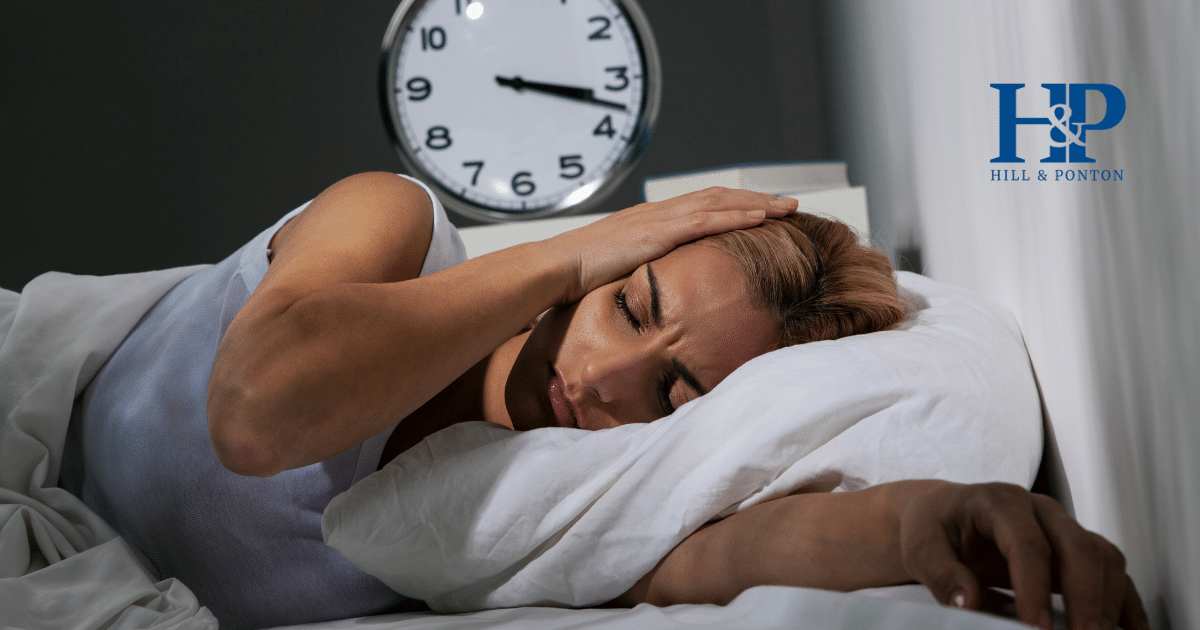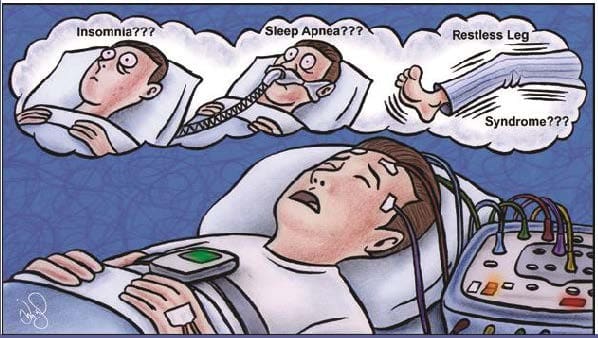Many veterans experience insomnia due to their service, which can significantly impact their ability to function in daily life. While insomnia is not given a separate diagnostic code by VA, it is often rated under the Schedule of Ratings for Mental Disorders (38 CFR § 4.130) as part of an underlying condition such as PTSD, depression, or anxiety. Understanding how VA rates insomnia can help veterans pursue the benefits they deserve.
How VA Rates Insomnia
VA rates insomnia as a mental health disorder, such as PTSD or depression. The rating percentages assigned to mental health disorders are:
- 0%: A mental condition has been formally diagnosed, but symptoms are not severe enough either to interfere with occupational and social functioning or to require continuous medication.
- 10%: Occupational and social impairment due to mild or transient symptoms which decrease work efficiency and ability to perform occupational tasks only during periods of significant stress, or symptoms controlled by continuous medication.
- 30%: Occupational and social impairment with occasional decrease in work efficiency and intermittent periods of inability to perform occupational tasks (although generally functioning satisfactorily, with routine behavior, self-care, and conversation normal), due to such symptoms as: depressed mood, anxiety, suspiciousness, panic attacks (weekly or less often), chronic sleep impairment, mild memory loss.
- 50%: Occupational and social impairment with reduced reliability and productivity due to such symptoms as: flattened affect; circumstantial, circumlocutory, or stereotyped speech; panic attacks more than once a week; difficulty in understanding complex commands; impairment of short- and long-term memory; impaired judgment; impaired abstract thinking; disturbances of motivation and mood; difficulty in establishing and maintaining effective work and social relationships.
- 70%: Occupational and social impairment, with deficiencies in most areas, such as work, school, family relations, judgment, thinking, or mood, due to such symptoms as: suicidal ideation; obsessional rituals which interfere with routine activities; speech intermittently illogical, obscure, or irrelevant; near-continuous panic or depression affecting the ability to function independently, appropriately and effectively; impaired impulse control; spatial disorientation; neglect of personal appearance and hygiene; difficulty in adapting to stressful circumstances; inability to establish and maintain effective relationships.
- 100%: Total occupational and social impairment
A diagnosis of insomnia, without other concomitant mental disorders, typically receives, at least initially, a 30% rating for chronic sleep impairment.
Is Insomnia a Presumptive Condition?
Insomnia itself is not considered a presumptive condition by VA. However, Gulf War veterans may qualify for a presumptive service connection for sleep disturbances under 38 CFR § 3.317, which addresses medically unexplained chronic multisymptom illnesses (MUCMIs).
Veterans who served in specific areas during the Gulf War and experience sleep disturbances like insomnia without a specific etiology could argue that this condition is a part of a chronic multisymptom illness.
Getting VA Disability for Insomnia
Veterans seeking VA disability benefits for insomnia need to establish service connection by showing:
- A current diagnosis of insomnia.
- Evidence that insomnia was caused by or aggravated during military service or that it began during service.
- A medical nexus linking insomnia directly to the military service or to a service-connected condition, such as PTSD or a chronic pain disorder.
Veterans are encouraged to document their symptoms, provide statements from family or friends about the impact of insomnia, and consult with healthcare providers to ensure their claim accurately reflects the severity of the condition.
Case Example: VA Rating for Insomnia
In this case, a veteran who served on active duty from 2009 to 2014 filed for a disability rating increase for unspecified insomnia disorder. The veteran initially received a 50% disability rating but appealed for a higher rating, believing their symptoms were more severe.
The Board decided to increase the veteran’s insomnia disorder rating to 70%, recognizing the severe impact of the condition on the veteran’s social and occupational life, particularly due to suicidal ideation and disturbances in mood.
Why VA Granted this Rating:
- Suicidal Ideation and Severe Symptoms: One of the primary reasons for the increased rating was the presence of suicidal ideations. The VA examination and treatment records revealed several instances where the veteran reported thoughts of suicide without a specific plan, and these episodes were seen as a significant impairment to their social and occupational functioning.
- Multiple VA Examinations and Consistent Symptom Reporting: The veteran underwent two separate VA mental disorder examinations, one in August 2016 and another in February 2017, both of which confirmed symptoms of chronic sleep impairment, depression, and difficulty establishing social relationships. These consistent findings helped substantiate the claim for a higher rating.
- VA Treatment Records Supporting Increased Rating: The Board also relied on the veteran’s VA treatment records, which showed persistent complaints of insomnia, depression, and suicidal thoughts. Notably, records from February and March 2017 indicated ongoing mental health concerns, such as suicidal thoughts occurring multiple times a week, despite no specific plan or intent.
- Recognition of Social and Occupational Impairment: The Board acknowledged that the veteran’s insomnia caused significant impairments in areas like work, family relations, judgment, and mood. Although some records noted milder insomnia symptoms, most of the evidence demonstrated a level of impairment consistent with a 70% rating, which includes significant occupational and social deficiencies.
This case highlights the importance of providing thorough medical records and detailed symptom reports when seeking an increased VA rating for insomnia. Veterans experiencing severe impairments, including suicidal ideation, are more likely to receive a higher disability rating, as seen in this case where the veteran was awarded a 70% rating for his insomnia.
However, to maximize your claim’s success, it’s important to address all contributing factors and ensure you have a comprehensive record of your symptoms and their impact on daily life.
My Claim Was Denied, What Can I Do?
If your claim for insomnia is denied, you have several options:
- Request a Higher-Level Review by a senior VA reviewer
- File a Supplemental Claim with new evidence
- File an Appeal within one year of VA’s decision
The best course of action depends on the specifics of your case. It is recommended that veterans seek assistance from a VA-accredited representative to navigate the appeals process and gather additional evidence if necessary.
How to Increase VA Rating for Insomnia
If your current VA rating does not adequately reflect the impact of insomnia on your life, you may request a re-evaluation or submit additional evidence to increase your rating. This could include:
- Medical records show worsening symptoms or additional complications from insomnia.
- Lay statements from family or friends about the day-to-day effects of insomnia.
- New medical evaluations that link insomnia to service or other service-connected conditions.
Insomnia and Secondary Conditions
When it comes to increasing VA ratings for insomnia, veterans often experience insomnia as part of a larger constellation of secondary mental health or physical issues. Conditions like Post-Traumatic Stress Disorder (PTSD) and chronic pain can severely impact a veteran’s ability to sleep, which in turn can worsen their overall health. Addressing both mental and physical symptoms of insomnia is crucial when pursuing a higher VA rating.
Veterans with PTSD often experience nightmares, flashbacks, and anxiety that disrupt sleep, leading to avoidance of rest and heightened night-time anxiety. This can worsen insomnia, making them more sensitive to noise and silence. Some may resort to alcohol or drugs to sleep, further harming their health. Since insomnia can be an extension of PTSD symptoms, veterans may qualify for a higher VA mental health rating, as sleep disturbances like insomnia can limit social and occupational functioning.
Chronic pain from service-connected injuries frequently disrupts sleep, creating a cycle where poor sleep worsens pain and leads to depression and anxiety. Pain medications, like morphine or codeine, can further disturb sleep patterns. Veterans with service-connected physical pain that causes insomnia may be eligible for a secondary VA disability rating, especially if a medical professional confirms the link between their pain and insomnia.
Total Disability Individual Unemployability (TDIU)
Veterans who are unable to work due to their service-connected insomnia, or a combination of insomnia and other conditions, may qualify for Total Disability based on Individual Unemployability (TDIU). Veterans rated at 60% or more for mental health conditions, including insomnia, may be eligible for compensation at the 100% rate if their condition prevents them from maintaining gainful employment.
By understanding how VA evaluates insomnia and gathering the right evidence, veterans can increase their chances of receiving the appropriate disability rating.
Case Example: TDIU Granted for Insomnia Disorder
In this case, a veteran who served on active duty from 1968 to 1969 filed for Total Disability Individual Unemployability (TDIU) based on service-connected insomnia and other physical conditions. The veteran’s insomnia, initially rated at 30%, was later increased to 50%. The Veteran appealed for TDIU, asserting that his insomnia and related conditions precluded him from securing gainful employment.
The Board of Veterans’ Appeals granted TDIU from August 2017 to June 2019, recognizing that the veteran’s insomnia and other service-connected disabilities prevented him from securing or maintaining substantially gainful employment. This decision provided the veteran with full benefits during that period before he received a 100% schedular rating.
What Made the Board Decide in the Veteran’s Favor?
- Impact of Insomnia on Work Performance: The veteran’s chronic insomnia caused frequent sleep disturbances, leading to irritability and chronic fatigue. This, in turn, affected his ability to function reliably in the workplace. Multiple medical evaluations detailed the veteran’s impaired social and occupational functioning, with sleep disturbances being a significant factor in his inability to work.
- Vocational Opinion Support: A vocational expert’s December 2022 opinion was crucial. It concluded that the veteran’s insomnia and physical impairments made it impossible for him to maintain any form of gainful employment, including sedentary work. This expert noted that insomnia contributed to poor concentration, inability to follow instructions, and inconsistent productivity.
- Evidence of Reduced Physical Capability: The veteran’s service-connected physical conditions, including knee and back issues, further reduced his ability to engage in both physical and sedentary work. He required the use of a cane and reported difficulty sitting, standing, or walking for extended periods, exacerbating the limitations caused by his insomnia.
- Cumulative Effect of Disabilities: The combination of insomnia, physical limitations, and secondary mental health symptoms like anxiety and irritability created a situation where the veteran could not secure or follow a substantially gainful occupation, meeting the criteria for TDIU under 38 C.F.R. § 4.16.




